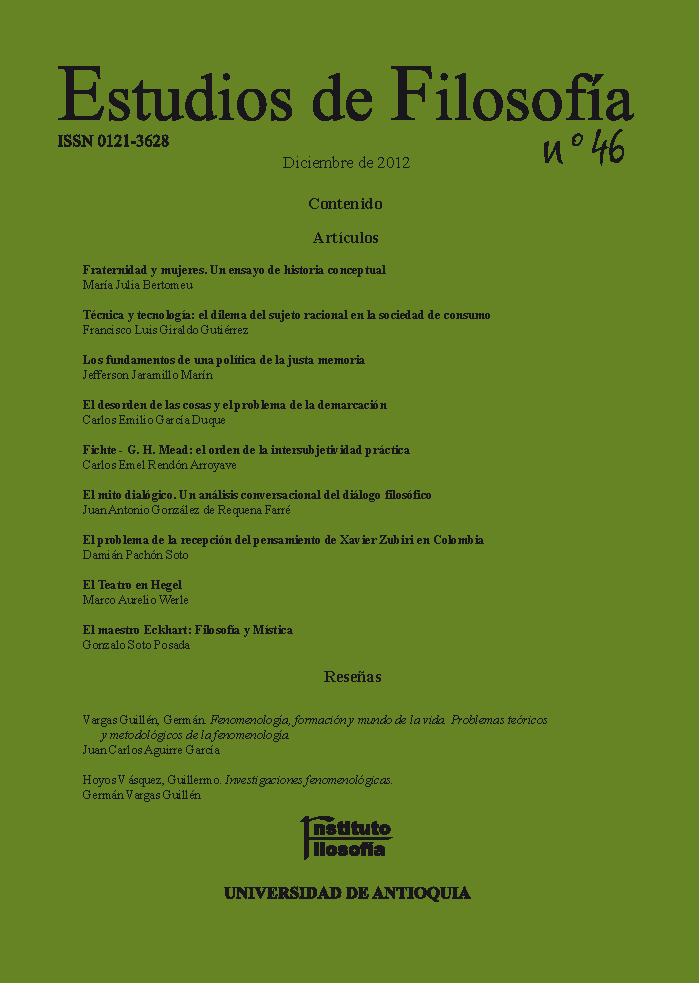El Maestro Eckhart: filosofía y mística
DOI:
https://doi.org/10.17533/udea.ef.14765Palabras clave:
Eckhart, mística, teología negativa, oxímoron, desposeimiento, nada silente, desierto, vacío, nombres divinos, humildad, voluntad divina.Resumen
El artículo intenta mostrar cómo la mística del Maestro Eckhart es la sumersión en la nada silente de Dios como plenitud vacía y vacío pleno, en el desierto de la abundancia divina del no ser del ser de Dios, gracias al cumplimiento de la voluntad divina como ascenso que la cumple sin cumplirla. Para ello, analiza la vida, la obra y el pensamiento del Maestro con base en sus textos El libro del consuelo divino, El fruto de la nada, Vida eterna y conocimiento divino, Ecos de la Edad Media. Termina con un epílogo en el que se analiza el grano de mostaza en donde se aclara lo del desierto abundante de la nada silente de Dios como el de muchos nombres sin nombre.
Descargas
Citas
DE LIBERA, A. (1994) La mystique rhénane. D’Albert le Grand à Maître Eckhart. Paris: Seuil.
DENZINGER, E. (1995) El magisterio de la Iglesia. Barcelona: Herder.
FAGGIN, G. (1953). M. Eckhart y la mística medieval alemana. Buenos Aires: Sudamericana.
FLÓREZ, A. (1983) La ética de Meister Eckhart. Bogotá: PUJ.
LOMBANA VILLALBA, I. M. (2007) ‘Sufrimiento que no sufre’: La ética intelectualista del Maestro Eckhart. Medellín: Diké.
LOSSKY, V. (1998) Théologie Négative et connaisance de Dieu chez Maitre Eckhart. Paris: Vrin.
MAESTRO ECKHART. (1998) Ecos de la Edad Media. Treinta días con un gran maestro espiritual. Meister Eckhart. Trad. Alfonso Rincón González. Bogotá: Norma.
MAESTRO ECKHART. (1998) El fruto de la nada. Trad. Amador Vega Esquerra. Madrid: Siruela.
MAESTRO ECKHART. (1996) El libro del consuelo divino. Trad. Alfonso Castaño Piñán. Medellín: Grafoprint.
MAESTRO ECKHART. (2003) Vida eterna y conocimiento divino. Trad. Miguel Grinberg. Buenos Aires: Deva’s.
OECHSLIN, R.-L. (1960) Eckhart (Maitre Eckhart). En: Dictionnaire de Spiritualité ascetique et mystique, doctrine et histoire. Tome IV/1. Paris: Beauchesne, pp. 93-115.
REYES, O. (2000). La ontología mística de Meister Eckhart y la cuestión teológica en Heidegger. Bogotá: Orión Editores.
RUH, K. (1997). Initation á Maitre Eckhart. Paris: Cerf. Recuperado de: www.laeditorialvirtual.com.ar/pages/MeisterEckart/00_Indice.htm
Descargas
Publicado
Cómo citar
Número
Sección
Categorías
Licencia
Derechos de autor 2012 Gonzalo Soto Posada

Esta obra está bajo una licencia internacional Creative Commons Atribución-NoComercial-CompartirIgual 4.0.
Los autores que publican en Estudios de Filosofía acuerdan los siguientes términos:
1. El Autor retiene el copyright del "Artículo", por el cual se entiende todos los objetos digitales que pueden resultar de la subsiguiente publicación o distribución electrónica.
2. En conformidad con los términos de este acuerdo, el autor garantizará a Estudios de Filosofía como Editor el derecho de la primera publicación del artículo.
3. El Autor le concederá al Editor un derecho perpetuo y no-exclusivo, así como una licencia de la misma clase, de publicar, archivar y hacer accesible el Artículo parcial o totalmente en todos los medios conocidos o por conocerse, derecho y licencia que se conocen como Creative Commons License Deed. Atribución-No Comercial- Compartir igual CC BY-NC-SA o su equivalente que para efectos de eliminar toda duda, le permite a otros copiar, distribuir, y transmitir el Artículo bajo las siguientes condiciones: (a) Atribución: Se deben reconocer los créditos de la obra de la manera especificada por el Autor a Estudios de Filosofía, pero no de una manera que sugiera que tiene su apoyo o que apoyan el uso que hace de su obra. (b) No Comercial: No se puede utilizar el Artículo para fines comerciales.
4. El Autor puede realizar otros acuerdos contractuales no comerciales para la distribución no exclusiva de la versión publicada del Artículo (v. gr. ponerlo en un repositorio institucional o publicarlo en un libro) con la condición de que haga el debido reconocimiento de su publicación original en Estudios de Filosofía.
5. A los Autores se les permite y Estudios de Filosofía promueve publicar en línea (online) la versión pre-impresa del Artículo en repositorios institucionales o en sus páginas web, antes y durante la publicación, por cuanto que puede producir intercambios académicos productivos, así como una mayor citación del Artículo publicado (ver The Effect of Open Access). Dicha publicación durante el proceso de producción y en la publicación del Artículo se espera que se actualice al momento de salir la versión final, incluyendo una referencia a la URL de Estudios de Filosofía.















